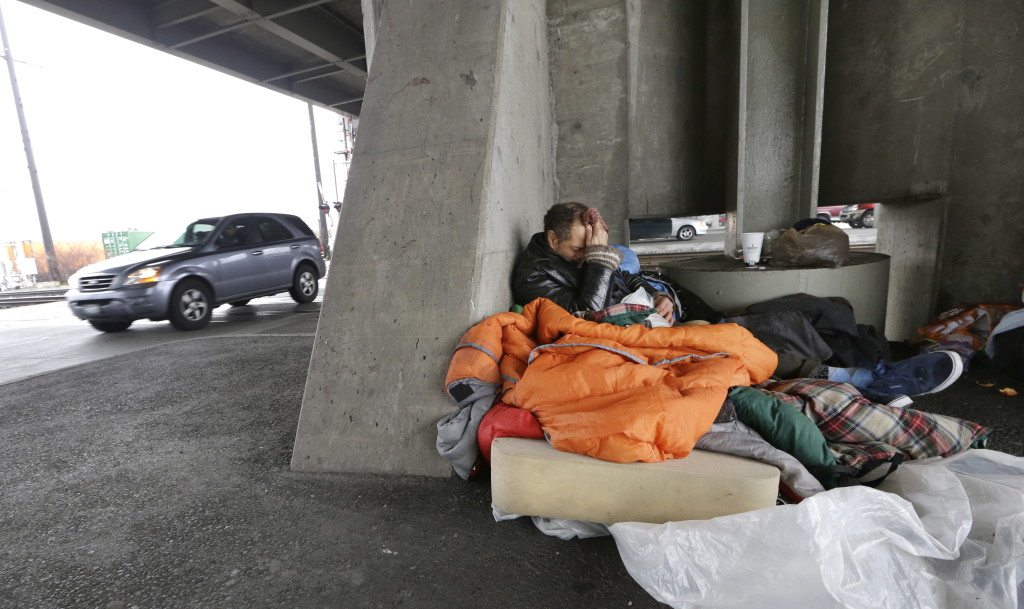SEATTLE — When Bobby Miller decided to run for Seattle City Council on a platform focused on income inequality and homelessness, he didn’t expect to become homeless himself.
The Kentucky-born bartender moved to Seattle for the minimum wage and gay-friendly culture. But rent was higher than he expected, and when he lost his first job, Miller struggled to find another affordable place. So he moved into his car — temporarily, he thought.
He drained his bank account down to $50 to pay the filing fee and planned to run the campaign for District 6, which includes Ballard, from his car. But after weeks of missing political meet-and-greets for work and a steady stream of rejections from endorsing groups, he gave up.
“It just came to a point – ‘This is not going to work because you’ve got to have the big money come in first,’?” he said.
The nature of homelessness can impede people from a democratic process slick with cash. But in this election year, where homelessness is the biggest issue in Seattle’s seven council races, homeless people themselves could have an unusual amount of influence.
For the first time this primary, voters in King County will be able to register and vote on Election Day, a potential game-changer for homeless people who don’t always have a place to receive their ballots by mail. Some state legislators, meanwhile, will be keeping their eye out for potential abuse of the new rule.
“The number of voters experiencing homelessness is the same. The difference is access,” said Alison Eisinger, executive director of the Seattle/King County Coalition on Homelessness. “Same-day voter registration is designed to make it easier for eligible voters to participate – whether they have homes or not.”
There do not appear to be many people voting while homeless in King County: 948 active voters are registered at a shelter as their residential or mailing address; an additional 37 registered in tiny-house villages.
It’s possible for someone to register to vote using a park or even an intersection. But those registrations are few, according to Kendall LeVan Hodson, chief of staff at King County Elections. Besides economic barriers, many people still don’t know that they can vote without a fixed address, a right established by federal-court rulings in the ‘80s.
While same-day registration opens the door for access, it also opens the door for abuse of the system, says Rep. Jim Walsh, R-Aberdeen, ranking minority member of a legislative committee overseeing elections.
To Walsh, registering an address at a park or an intersection raises the possibility of homeless people being exploited for their votes. Last November, nine people were arrested in Los Angeles and charged with a fraud scheme for paying homeless people on Skid Row to forge signatures on ballot-measure petitions.
Walsh said it’s simply important to keep an eye out. “Opening the door to abuse doesn’t mean abuse,” Walsh said. “We should be OK (with the proper oversight).”
Across the city, homeless voters are considering their options, faced with a municipal election where they are under the microscope.
Harlan Wood sells Real Change street newspapers outside of the Wallingford QFC. He has stayed on a friend’s couch for years, but before that he lived in a tent and was swept by police while he was at work at McDonald’s. He says he nearly lost all his belongings, and believes camp removals are cruel.
Wood met council candidate Shaun Scott when Scott was Real Change’s editor last year, and likes Scott’s opposition to camp removals, as well as his past experience registering voters in Seattle’s tiny-house villages for a previous candidate. Wood now sometimes hands out pamphlets for Scott, who’s competing against nine other candidates in District 4, which covers Eastlake, Wallingford, the University District and northeast Seattle.
“He’s straight to the point, he doesn’t pull no punches,” Wood said.
Eisinger, whose coalition is trying to get the word out about same-day registration, cautioned against “candidates acting as though they’re going to go cultivate the homeless vote.” “This isn’t a voting bloc any more than people with brown eyes are a voting bloc,” she said.
Ava Levine, who was homeless from 2014 to 2016 as she struggled with bipolar disorder, is on the opposite side of the spectrum from Wood. She says interactions with compassionate but firm police were a key part of her journey off the streets, and she wants more police and first responders on the streets.
She has volunteered for the campaign of council candidate Brendan Kolding, a former Seattle police officer who opposes the city’s tiny-house villages and supports a tent-camping ban, as well as more shelters. Kolding is one of two candidates challenging incumbent Councilmember Lisa Herbold in District 1, which encompasses West Seattle and South Park.
“Vulnerable people need protection, and they need guidance,” said Levine.
As a candidate, Miller proposed more help for people on the edge of homelessness by offering things like free transit, and supported more access to addiction treatment. Now that he’s not running in a District 6 race crowded with 13 contenders, he likes candidate Jay Fathi, a doctor who has worked at Neighborcare Health’s 45th Street clinic, which serves many low-income and homeless patients.
“I like that he understands addiction,” Miller said. “It’s not like homeless versus the Seattle resident. It’s someone saying ‘there’s homelessness but inside of that there’s also addiction as well, and I have programs to work on at least that part of it.’”



